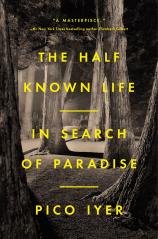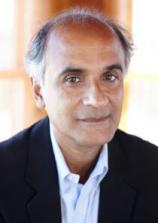The Half Known Life: In Search of Paradise
Review
The Half Known Life: In Search of Paradise
In 1974, when Pico Iyer was a teenager, he traveled to India, where his father was meeting with the Dalai Lama. There the boy and the most exalted monk in Buddhism began a friendship that has deepened over nearly half a century.
This friendship is not narrowly built around Buddhism. Iyer’s father was an Indian philosopher and political theorist who moved his family to California, where he joined a think tank and started teaching at the University of California, Santa Barbara. His mother was a religious scholar. Their son’s education was just as international: Eton, followed by Oxford, then a master’s degree in literature at Harvard. And then, for decades, journalism: 100 articles a year for Time, with more for other top-drawer publications. Books? 15 so far. And four TED talks that have been viewed more than 10 million times. The frequent topic: travel.
"Iyer is much more than a sagacious travel writer. Because of his education and friendships, he’s uniquely qualified to reveal a culture through the lens of his personal experience and decades of self-exploration. No one, it seems, sees more than a travel writer with inner vision."
You and I increasingly find travel unpleasant, especially if we’re jammed in a basic coach seat on a long flight. That’s not Pico Iyer’s experience: “I am a multinational soul on a multinational globe on which more and more countries are as polyglot and restless as airports. Taking planes seems as natural to me as picking up the phone or going to school; I fold up my self and carry it around as if it were an overnight bag.”
Iyer is much more than a sagacious travel writer. Because of his education and friendships, he’s uniquely qualified to reveal a culture through the lens of his personal experience and decades of self-exploration. No one, it seems, sees more than a travel writer with inner vision.
The subtitle of his memoir, “In Search of Paradise,” evokes “The White Lotus.” Iyer seeks the exact opposite. “The pursuit of happiness,” he writes, “made deepest sense in context of the Buddhist principle that suffering is the first truth of existence.” It follows that the desire for paradise isn’t a solution to our problems. It is the problem: “What kind of paradise can ever be found in a world of unceasing conflict --- and does the search for it not simply aggravate our differences?” Clearly, this is not like any other travel book you’ve read.
Iyer’s travels start in Iran, where “already I was having to rethink everything.” In one of the largest cemeteries on earth --- “home to one and a half million dead bodies” --- the fast track to heaven belongs to martyrs. And who are today’s martyrs? This sentence gave me chills: “Soldiers in their teens running toward enemy guns with plastic keys around their necks to open the doors to paradise.” Then there’s the flip side, back in the hotel: “I slipped off my shoes, lay back, and was treated to slices of watermelon and cups of strong tea in what felt like heaven on earth.” And, always, there’s the surveillance culture: “The Laleh Hotel is famous for its bugs; most of the people in the lobby looked to be neither guests nor staff.”
Onward to Belfast, Kashmir, western Australia, Sri Lanka and Varanasi, each seen through a spiritual lens. Some destinations moved me less than others, but I always appreciated the factoids: “Australia is said to be the only country where the majority of serpents are venomous.” And the big picture never failed to make me mark the pages and dog-ear the corners: “[I]n Jerusalem, humans were so sure of their gods that each one drew, in rough bold strokes, his own image of paradise on top of somebody else’s; it was dangerously easy to believe that what we do with heaven is even more important than what heaven does to us.”
And then there’s traveling with the Dalai Lama. Iyer was by his side for every hour of his working day on 10 trips to Japan in 12 years. The Dalai Lama, he reports, “had no interest in wishful or romantic notions; true to the example of what he called his ‘big boss,’ the Buddha, he always seemed to see himself as a doctor of the mind.” Asked in a public lecture what to do after you’ve been disappointed in a worthy dream, “the Dalai Lama looked at the questioner with great warmth and said, ‘Wrong dream!’”
It’s in the final chapters that Iyer delivers the book’s gold. Many of us see life through screens, reducing fellow humans to two dimensions. The half known life --- the phrase comes from Herman Melville --- is where so many of our possibilities lie: “it’s everything half known, from love to faith to wonder and terror, that determines the course of our lives…. Everything in life that we can’t begin to make sense of… that’s what opens the door to a sense of something beyond us, and a useful humility…. We can never begin to guess what will happen next. The world is always more complex than our ideas of it.”
I was immensely clear-headed when I closed THE HALF KNOWN LIFE. I went out for a walk, and there, by the track, I saw the last rose of a winter that was slow in coming. Three hours later, the temperature dropped 20 degrees. I bundled up and returned to the track to see if the rose survived. It was petals on the ground. I noted that. I also noted that Pico Iyer’s book had sharpened my senses.
Reviewed by Jesse Kornbluth for HeadButler.com on January 13, 2023
The Half Known Life: In Search of Paradise
- Publication Date: January 10, 2023
- Genres: Memoir, Nonfiction, Philosophy, Religion
- Hardcover: 240 pages
- Publisher: Riverhead Books
- ISBN-10: 059342025X
- ISBN-13: 9780593420256




